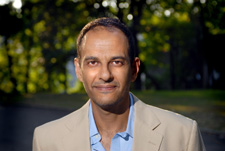Award-Winning Author Discusses ‘Being Young and Arab in America’

In his award-winning book “How Does It Feel To Be a Problem?: Being Young and Arab in America,” Moustafa Bayoumi presents portraits of 20-something Arab-Americans living in Brooklyn, N.Y., who face surveillance and detentions, workplace discrimination, threats of vigilante violence, and the disappearance of friends or family.
Bayoumi will reflect on what it means to be Arab-American and Muslim-American today, 10 years after the terrorist attacks of 9/11, at a lecture at The University of Scranton on Thursday, Nov. 17, at 7 p.m. in the Pearn Auditorium of Brennan Hall.
Bayoumi’s book “How Does It Feel To Be a Problem?” won an American Book Award and the Arab American Book Award for Non-Fiction. He is co-editor of “The Edward Said Reader” and editor of “Midnight on Mavi Marmara: the Attack on the Gaza Freedom Flotilla and How It Changed the Course of the Israel/Palestine Conflict.”
Bayoumi’s articles have appeared in The New York Times Magazine, New York Magazine, CNN.com and The London Review of Books among others. He has been featured in The Wall Street Journal and the Chicago Sun-Times, as well as CNN, FOX News, Book TV, National Public Radio, and many other media outlets from around the world.
Bayoumi is a professor of English at Brooklyn College, City University of New York.
The lecture, which is open to the public, free of charge, is sponsored by the Office of Equity and Diversity. For additional information, call 941-7619.






